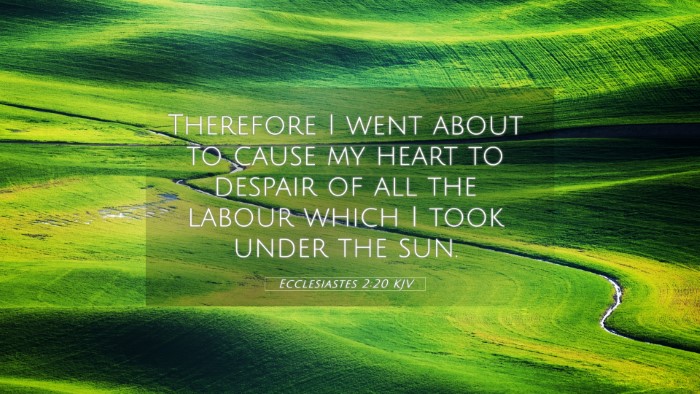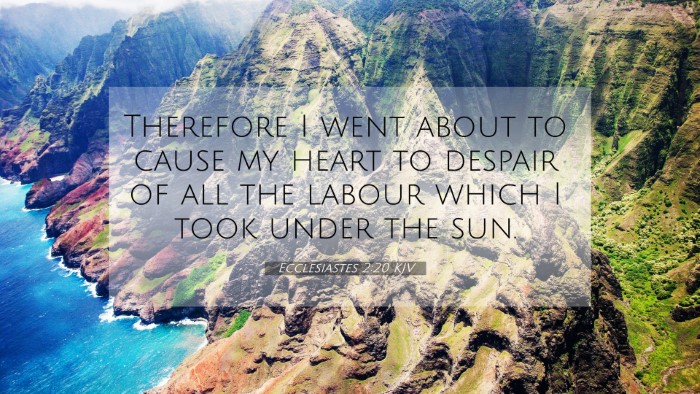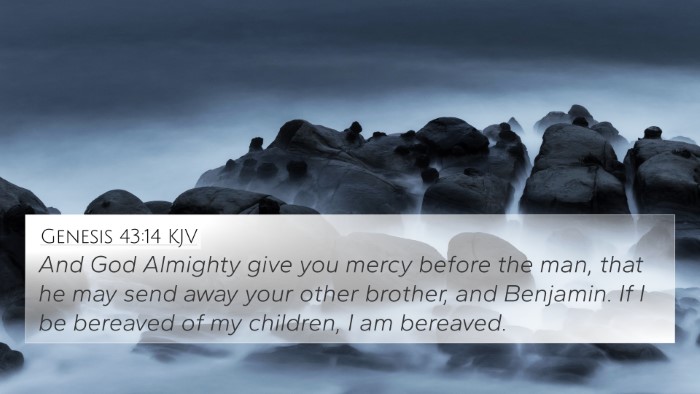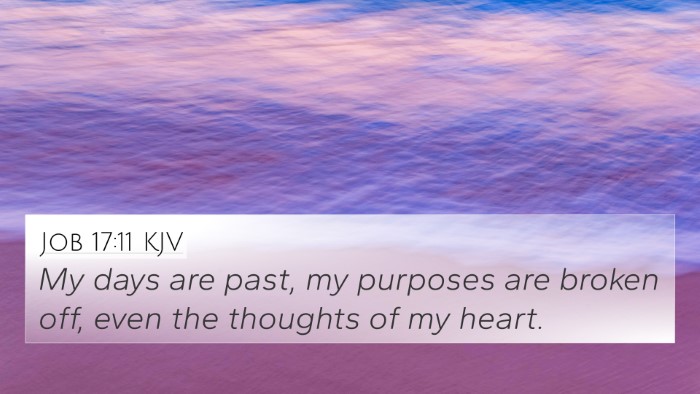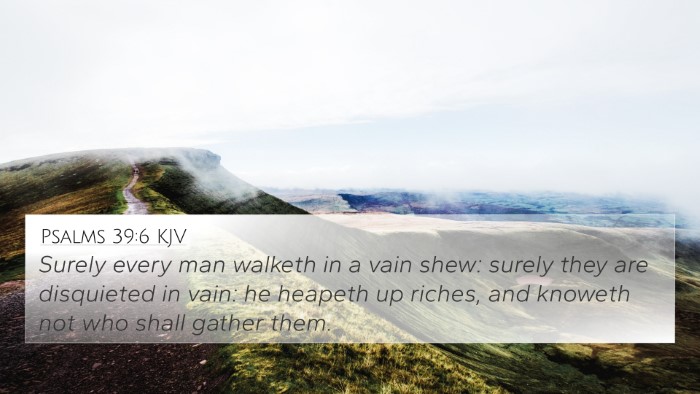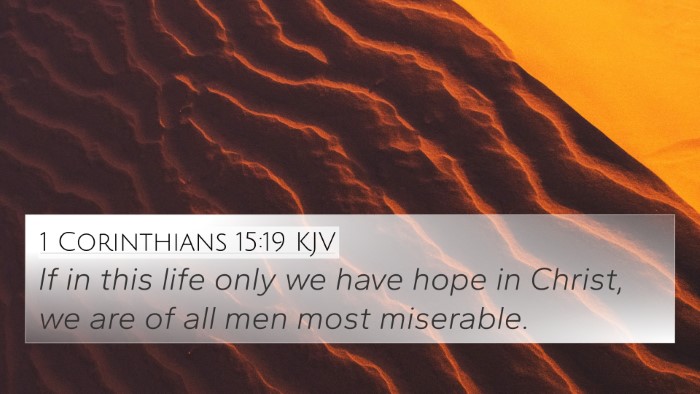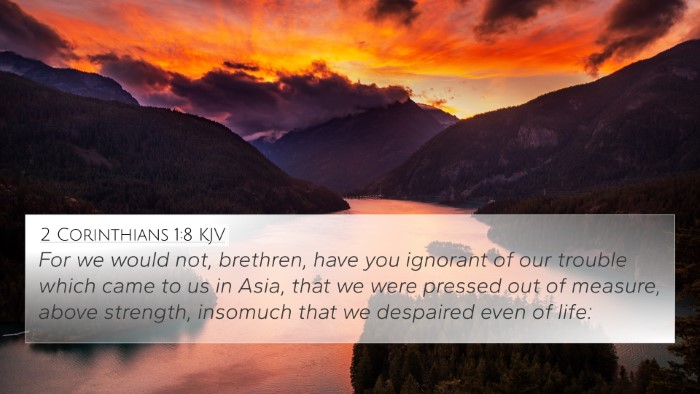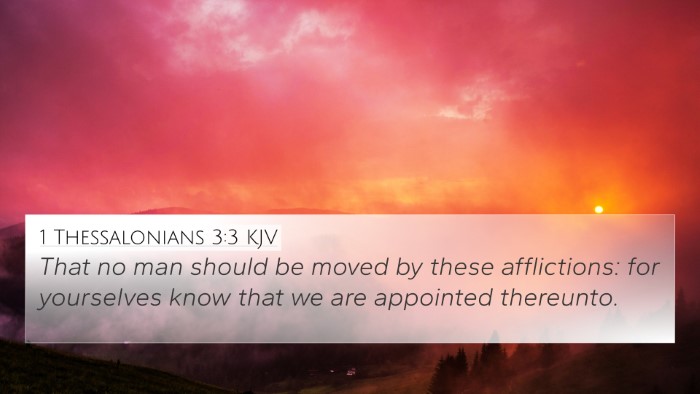Understanding Ecclesiastes 2:20
Ecclesiastes 2:20 states, "So I turned about to cause my heart to despair of all the labor which I took under the sun." This verse captures a moment of deep introspection by the Preacher (often understood as King Solomon) about the futility of life and the burdens associated with human toil.
Summary of Insights
- Feeling of Despair: The Preacher reflects on the labor and efforts made in life, feeling a sense of futility leading to despair. This resonates with the overarching theme of vanity that permeates the book of Ecclesiastes.
- Life's Labor Under the Sun: The phrase "under the sun" signifies the earthly realm and the temporal nature of human endeavors in contrast to eternal values and the divine.
- Introspection and Reflection: This moment illustrates a vital aspect of the Preacher's journey—self-reflection on the meaning and purpose of life, a common theological theme.
Comparative Analysis
This verse is significant as it connects to several other scriptures, illustrating the recurring biblical themes of labor, despair, and the search for meaning. Below are some relevant cross-references:
- Psalm 127:1-2: "Unless the Lord builds the house, they labor in vain who build it..." emphasizing the futility of labor without divine guidance.
- Ecclesiastes 1:14: "I have seen all the works that are done under the sun; and behold, all is vanity and a striving after wind." This reflects a similar sentiment of searching for meaning.
- Matthew 6:19-20: "Do not lay up for yourselves treasures on earth... but lay up for yourselves treasures in heaven," contrasting earthly labor with eternal rewards.
- 1 Corinthians 15:58: "Therefore, my beloved brethren, be steadfast, immovable, always abounding in the work of the Lord," suggesting a shift from earthly to spiritual labor.
- James 4:14: "For what is your life? It is even a vapor that appears for a little time and then vanishes away," reinforcing the fleeting nature of earthly endeavors.
- Proverbs 14:23: "In all labor there is profit; but the talk of the lips tendeth only to penury." This verse contrasts productive labor with idle talk or efforts.
- Isaiah 40:6: "All flesh is grass, and all the goodliness thereof is as the flower of the field..." which connects to the transient nature of life and achievements.
Thematic Connections
This verse ties in with various themes found throughout scripture, such as the nature of work, the pursuit of happiness, and existential despair.
- The Nature of Work: Ecclesiastes and Proverbs explore the results and consequences of labor, urging readers to seek purpose beyond mere work.
- Existential Reflection: The Preacher’s despair prompts readers to reflect on their own lives in relation to God’s eternal purposes.
- Spiritual Fulfillment: The analysis of labor leads back to understanding that true fulfillment is found in divine connection rather than earthly achievements.
How to Use This Verse in Study
Applying cross-references can deepen understanding. Tools for Bible cross-referencing, such as a Bible concordance or reference guide, help in making connections across scripture:
- Utilize a bible concordance for thematic studies.
- Investigate a bible cross-reference guide to explore related verses.
- Conduct a cross-reference Bible study for group discussions on life’s labor and purpose.
- Explore cross-referenced themes in both Old and New Testaments for comprehensive understanding.
- Identify links between the Prophets and Apostolic teachings to find continuity in God’s message about labor and purpose.
Conclusion
Ecclesiastes 2:20 encapsulates a fundamental aspect of human experience: the search for meaning amidst toil. By reflecting on this and related scriptures, one can appreciate the depth of biblical wisdom addressing existential questions, helping believers and seekers alike navigate their own lives in light of divine truth.

